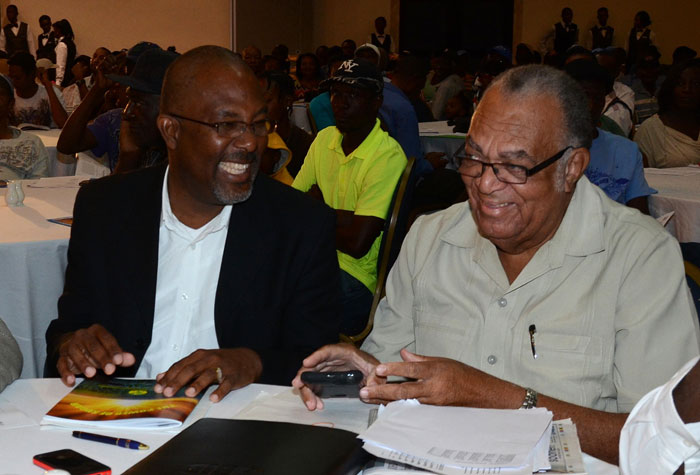Include Cane Farmers in Co-Generation Arrangement – State Minister Buchanan
By: , November 7, 2014The Key Point:
The Facts
- Mr. Buchanan was addressing the annual general meeting of the All-Island Jamaica Cane Farmers Association held on November 6 at the Jamaica Pegasus Hotel in New Kingston.
- Emphasising the importance of the industry, he noted that it has the highest level of “vertical integration” in the island, employing a wide range of professionals at various levels.
The Full Story
Minister of State for Agriculture, Labour, and Social Security, Hon. Luther Buchanan, is urging stakeholders in the sugar industry to agree on a formula, which will allow cane farmers to share in the anticipated revenues from electricity co-generation.
“So when we get…to that place where bagasse and the sugar factories play a major role in generating electricity, (farmers) can truly enjoy the power of sugar,” he said.
Mr. Buchanan was addressing the annual general meeting of the All-Island Jamaica Cane Farmers Association held on November 6 at the Jamaica Pegasus Hotel in New Kingston.
Emphasising the importance of the industry, he noted that it has the highest level of “vertical integration” in the island, employing a wide range of professionals at various levels. “Therefore, failure is not an option,” he said.
The State Minister asserted that a significant decline in sugar cane-related activities would adversely impact a minimum of 160,000 persons in, and around sugar-dependent communities.
“This would also intensify the urban drift, which would cause significant overload and pressure on our major towns, placing tremendous stress on our social and physical infrastructure,” he noted.
Meanwhile, he said significant investments are being made not just in production, but also in improving the lives of sugar farmers, through interventions such as the $2.4 billion Barracks Relocation Programme, which has already seen residents of sugar estate barracks being relocated to new housing.
Mr. Buchanan noted that provisions have been made to resettle all 876 residents in some 400 housing solutions under the European Union-funded Accompanying Measures for Sugar Programme.
Up to July, the Government had spent approximately $1.4 billion to construct 84 concrete houses in sugar-dependent areas under the programme. Thirty nine have been built in Steelfield, Trelawny; six at Barham; 17 in Shewsberry; and 22 in Muesmore, all in Westmoreland. The balance of 313 houses is being built at Springfield, Clarendon; and at Hampton Court and Stokes Hall in St. Thomas, for completion in December 2014, when the project is slated to end.
Meanwhile, Mr. Buchanan informed that more than $1.5 billion has been spent on social infrastructure such as roads, health centres, schools, and sport facilities through the Government’s Sugar Adaptation Strategy.
The 2013/14 crop year, which ran from December 2013 to July 2014, recorded a 22 per cent increase in cane production.
Some 15,436 tonnes of sugar cane was produced by Frome, Monymusk, Golden Grove, Worthy Park, Everglades, and Appleton.


